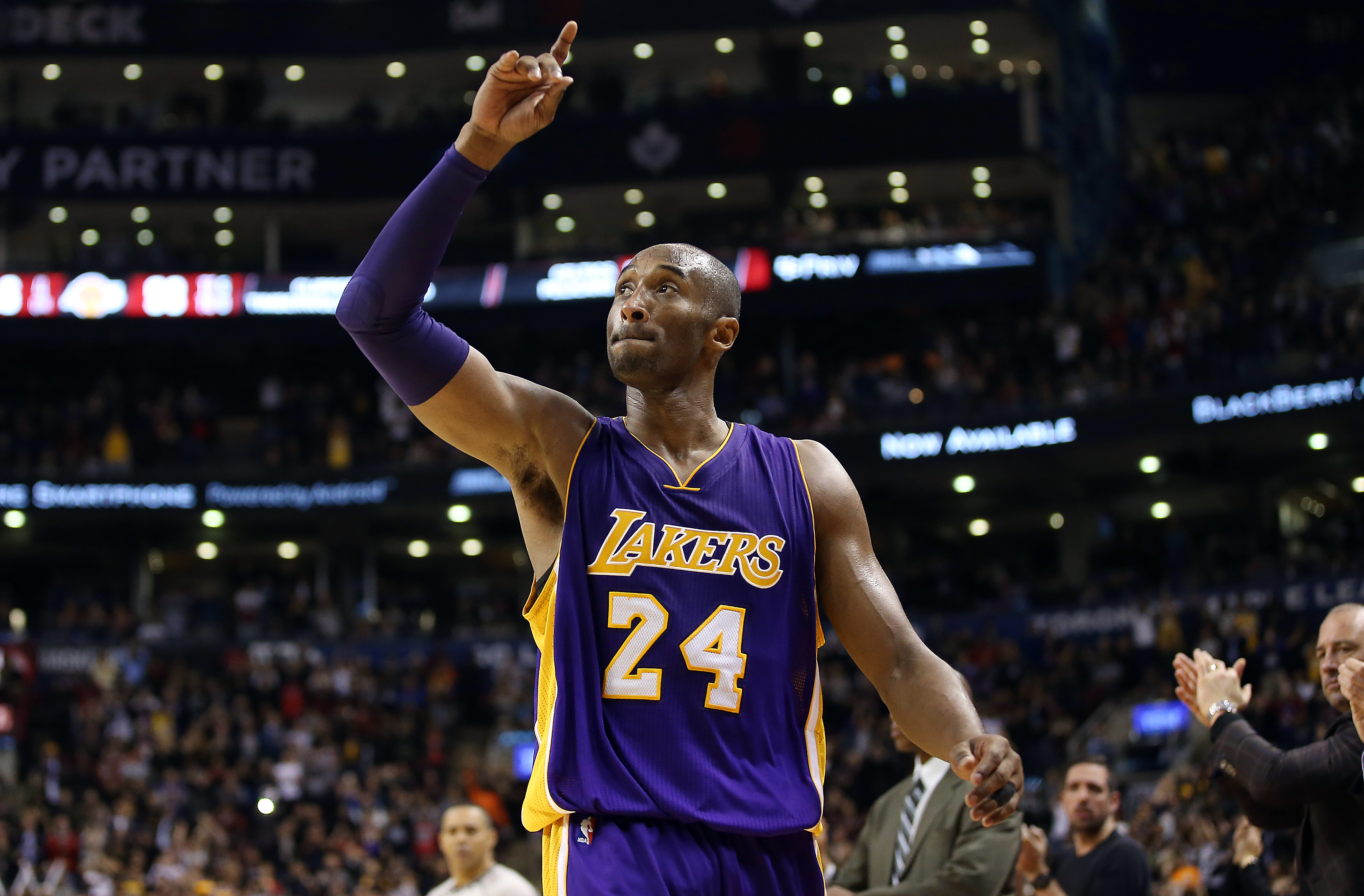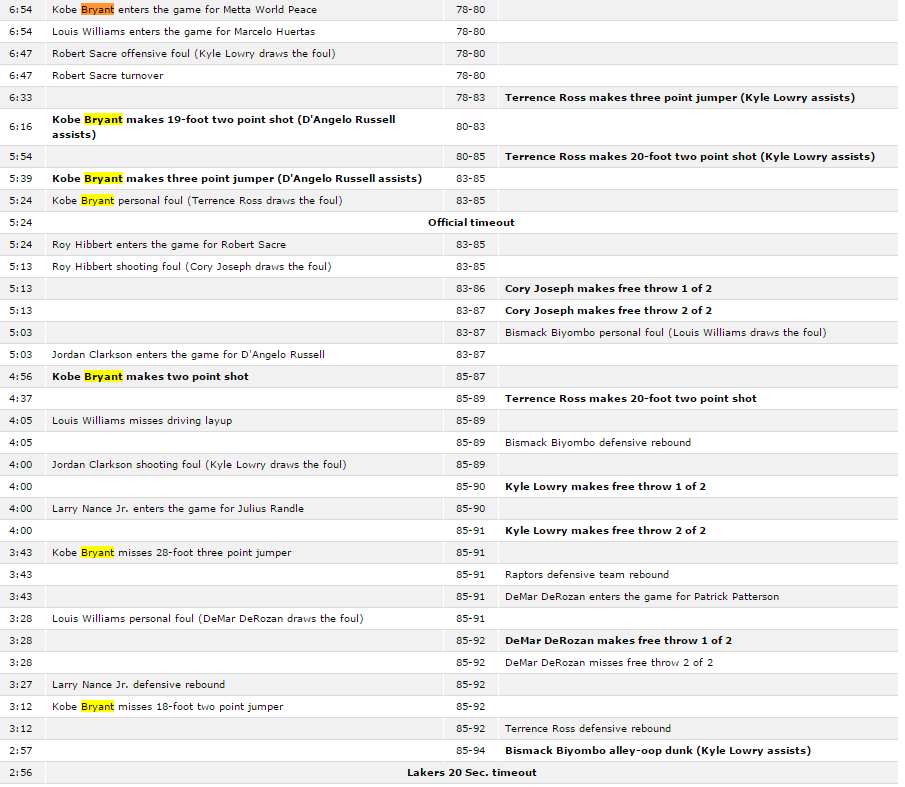Through three quarters, Kobe Bryant looked like the version of Kobe Bryant many had envisioned for the 37-year-old for the 2015-16 season.
He played facilitator in the first half against the Toronto Raptors, shooting just six times while dishing three assists, and the Lakers remained in the game but a good run behind. Sensing an opportunity, Bryant shot a little more in the third, looking to get the team’s offense going and take some pressure off of the team’s younger players. Jordan Clarkson was struggling with shot selection, D’Angelo Russell was inexplicably sent to the second unit, and Julius Randle curiously remained on the bench, so Bryant needed to turn back the clock for just a few minutes. He scored six in the quarter and the Lakers pulled to a draw entering the fourth.
This is what many had hoped for. Bryant, slowed by three major injuries and one of the most striking odometers in the sport’s history, taking a step back and only trying to be Vintage Kobe when necessary. The Lakers still wouldn’t be good in this case, but they could be competitive, and perhaps head coach Byron Scott would eventually come to grips with the realities of leading a rebuilding club and manage accordingly. Playing time alongside Bryant could be invaluable for Russell, Clarkson, and Randle, with the game’s most fierce competitor sharing lessons on work ethic, preparation, and how to relentlessly close out an opponent with a game on the line.
For Bryant, it would be a gentleman’s exit, accepting his own mortality and changing to fit his new circumstances for the greater good and for the good of himself. For the Lakers, it would provide more equity for future years while still allowing the franchise to celebrate perhaps their greatest star.
But Bryant isn’t Kevin Garnett, who can take on a smaller role while remaining Kevin Garnett by sheer force of personality and volume. And Bryant isn’t Ray Allen, who could take on a smaller role while remaining Ray Allen because the primary skill that made him who he is aged so gracefully. And Bryant certainly isn’t Vince Carter, who was able to transition to being something entirely different than Vince Carter as time demanded. Bryant isn’t even Michael Jordan – despite spending 20 years getting shoehorned, perhaps of his own volition, into The Next Michael Jordan role, a round hole for which no square peg has ever or will ever fit – changing his game less strikingly to reflect his surroundings and his own limitations.
Bryant is Bryant, and it would be a disservice to his legacy for him to be anything but what’s made him who he is, even as his body gives up and his effectiveness wanes dramatically.
That’s exactly why the fourth quarter played out as it did, with Bryant’s singular competitive nature demanding he be the one with the ball in his hands late, the game on the line.
Checking in with 6:54 to go and a two-point deficit, Bryant quickly went to work. He traded buckets with T.J. Ross, with each hitting a mid-range two and a triple over a span of 54 seconds. Nearly a minute passed, and then they traded mid-range twos again. Bryant was cooking, his long-mythologized ability to get hot with the game on the line in full display as the Air Canada Centre crowd roared in appreciation for one last throwback performance.
“They’re like horny for it,” Metta World Peace said after the game. “Like, horny. Horny fans. Yeah. Make sure you word that right. These people are obsessed, man. Horny, I’m telling you. Horny.”
In Ross, Bryant had found an unlikely but apparently willing adversary to go toe-to-toe with, bringing out the fire in Bryant like one-on-one showdowns always have. This was 81-point game Bryant and 51-point game Ross, the unlikeliest of 2015-16 battles imaginable, and exactly the type of budding virtuoso performance Bryant fans will remember him for long after his final season concludes.
But like an avatar for his entire career and the plight of the last few seasons, the fourth-quarter clock got the best of Bryant. The task on defense seemed unnecessarily arduous, the requisite force for the lift on a jumper now daunting. Still, like he has all season, Bryant remained Bryant, trying against all laws of aging, the ones that somehow apply to everyone but Tim Duncan, to will himself to a victory. Not the Lakers, but himself. “I mean, it’s not like we’re championship contenders or anything like that,” Bryant said after the game, willing to acknowledge that his battle to “figure out this puzzle” of aging probably couldn’t come within the confines of a competitive team.
He missed a long three. Then an 18-footer. The Lakers called timeout, now down nine with 2:57 to go.
Bryant was spent, and that timeout seemed to mark the end. He wouldn’t check out until a few minutes later, dishing one last assist. And, of course, getting to the free-throw line once more, as if he knew not only was a team’s inability to guard him even at 37 the slightest of feathers in his cap on a day in which he “Finally!” shot 50 percent, but because it would provide one last opportunity for a crowd that’s always treated him well to say goodbye. He checked out shortly after, having taken more shots than any other Lakers player, finishing with 21 points, eight rebounds, four assists, and four turnovers.
He began as passive facilitator and aged on-court mentor but finished as weather-worn gunslinger, firing erratically and taking down a few opponents as he ultimately went out, himself.
“That’s his competitive nature. That’s who he is, that’s why he’s a first-ballot Hall of Famer,” Raptors head coach Dwane Casey prophetically said before the game.
I’ve oscillated on how I feel about Bryant finishing his career in this manner. After taking in his final game against the Raptors, seeing the crowd reaction every time he touched the ball, and seeing how weightless, relieved, and happy Bryant seemed during media availability after the game, I’m glad it’s happening this way. Bryant fans probably don’t want to say goodbye to a version of him they don’t recognize, a watered-down Kobe Lite that’s more palatable over 30 minutes here in a meaningless 2015-16 but isn’t true to the Bryant that’s influenced a generation of fans and players over two decades.
Nobody can change that Bryant suffered injuries and that his last few years underwhelmed in terms of individual and team success. It’s remarkable anyone lasts 20 years in a sport, and Bryant has long put in the necessary work to ensure his longevity. It’s hard to say he was robbed of it given how long he remained at a peak, but by lasting this along he afforded himself the opportunity to go out how he chooses. He deserves the victory lap around the league, and those who eye-roll at the shot volume or minutes load are missing the point.
The 2015-16 Lakers are, in the grand scheme, meaningless to the landscape of the NBA and basketball at large. Bad teams are bad and forgettable, and while the outcome of the draft lottery can shape the team’s and league’s future, little of the day-to-day will matter or even be remembered. But Bryant, one of the league’s most important players ever, saying goodbye is incredibly meaningful. He deserves the chance to say goodbye to each city and stadium and fanbase, his legions of fans deserve it, and to be quite honest, his haters deserve one last chance to boo him, too. Bryant, Bryant stans, and Bryant detractors alike are all staying true to themselves and getting the most out of Bryant’s final season, something that probably wouldn’t be the case if everyone met in the middle to golf-clap a neutered Mamba playing a role he was never designed to play.
“Control what you can control and you’ve got to let everything else go,” Bryant said after the game.
The only thing Bryant can control as his body and age and universe all betray him is who he is. And who he is is Kobe Bryant, unabashedly and unapologetically.




